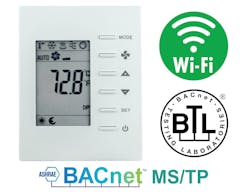Thermostats use BACnet to communicate
Contemporary Controls recently announced the availability of BACnet-compliant wired or wireless thermostats that are suitable for modulating heating, cooling, and ventilation for 4-pipe HVAC systems.
“The new thermostats are intended for modulated control of fan coil units (FCUs), which are often used on job sites because they allow the HVAC system to react to load changes within a space quickly and efficiently,” said Joe Stasiek, Contemporary Tools sales manager. “By providing modulated control, the thermostats work with FCUs to provide a more consistent and comfortable environment within a building.”
The new models join the company’s BASstat Communicating Thermostat series. They are BACnet compliant to ensure seamless integration into a BACnet/IP (WiFi) or BACnet MS/TP (EIA-458) networks, the company pointed out. The BAST-421C-B2 wired thermostat is BACnet MS/TP connected using an EIA-485 serial connection. The BAST-421C-BW2 wireless thermostat is BACnet/IP connected using a wireless connection to a nearby WiFi access point that supports IEEE 802.11b/g/n.
Both models provide modulated heating and cooling control in a wall-mount enclosure with an LCD. Intended for use with 4-pipe heated/chilled water FCUs, the thermostats can control two analog modulating water valve actuators and one binary supply fan. The LCD display indicates setpoint, space temperature, and current mode of operation using graphical icons.
“The thermostat helps to improve the control and delivery of conditioned air to suit the temperature requirements of an immediate space, which is ideal for applications that require individual temperature control, such as hotel rooms, offices, and apartments,” Contemporary Controls said. “As a result, FCUs maintain a more constant air temperature control, minimizing the time, energy, and cost to ramp up the system to maintain and deliver the desired temperature.”
A configurable control algorithm allows adaptability to the specific application. This adaptive control algorithm applied to modulated valve control saves energy and ensures comfort for occupants, the company added. Three sensing options are available: built-in temperature sensor, input for remote temperature sensor, or temperature override network command from the building automation system. Occupancy status can be set from thermostat buttons, a wired input, or over the BACnet network. Thermostat buttons can be locked to prevent tampering.
